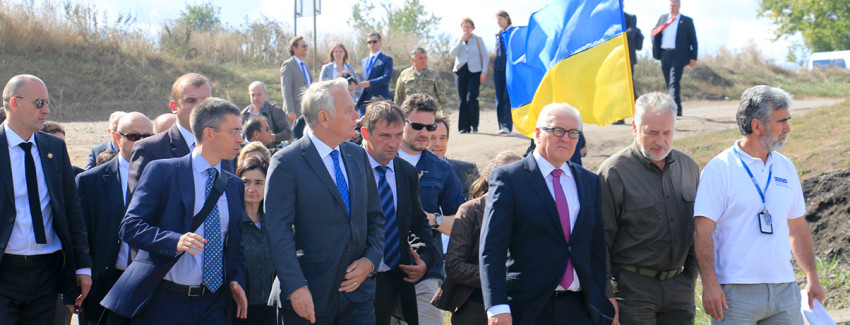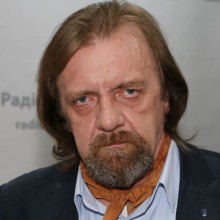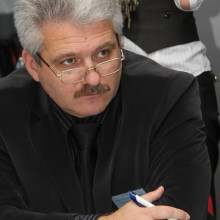Ukrainian political expert of NGO Maidan of Foreign Affairs Alexander Khara on why Kyiv shouldn't give in to Western ideas of Donbas conflict settlement.
The recent visit of the Foreign Ministers of Germany and France to Kyiv has caused quite a storm within Ukraine, thanks to their controversial vision of how to bring the Russian-Ukrainian conflict to an end.
In their statements, Steinmeier and Ayrault reminded Kyiv of the necessity of providing Donbas with a special status and granting amnesty to the militants, followed by the local elections. But what triggered the most criticism is the fact that the political process of the settlement should go in parallel with the withdrawal of the armed forces, and not after.
So this means that the Ukrainian Parliament must make the necessary changes to the Constitution while the ceasefire is still being violated, while the government forces and average citizens keep taking losses and while Ukrainian prisoners are still being held by the militants.
This strategy was immediately criticized by both Ukraine's politicians and experts. Political analyst Alexander Khara came up with seven reasons Kyiv should reject the Western ministers' offer.
‘Illogical sequence. If we are to agree with the proposal of the Foreign Ministers, we will be possibly the first country that proceeds with the political settlement before a ceasefire, before lasting peace, and before the withdrawal of the foreign troops from our territory and disarmament of the illegal troops in Donbas', Khara said.
While various experts are calling the idea unacceptable, Steinmeier said that Moscow had actually promised that the truce would not be violated by the Russian-backed separatist forces. But here lies another reason not to accept the Ministers' proposals, because the Kremlin refuted the German Minister's assurances, claiming again that Russia is not a part of the conflict.
‘Putin's speaker (Dmitry Peskov – UT) recently denied any promises on the ceasefire, saying that Moscow has no influence over the militants in Donbas', Khara stated, adding that this disparity certainly isn't reassuring.
The lack of trust is a reason enough not to raise hopes on the firm ceasefire in the future. As Khara said, Russia is pumping up its military presence in Crimea, Donbas and along the Ukrainian border, so it's hard to believe Moscow won't use its troops as a leverage. Especially considering that Russia still denies its involvement in the conflict and claims it doesn't control the militants, doesn't run the fake governments in Donetsk and Luhansk and doesn't supply them with money and weapons.
‘The West is putting pressure on the wrong side', Khara states, reiterating that the Ministers are urging Kyiv to advance the implementation of the Minsk deal, while Russia is still reluctant to do so as well.
According to him, it plays along Moscow's strategy, whose ultimate goal is to ‘return Ukraine back to its sphere of influence'. The expert adds, the Kremlin wants the future Donbas reps, officially elected, to have a veto on the Ukrainian Parliament's decisions, such as entering NATO or the EU. That's why Kyiv cannot agree to hold elections in the separatist-hold areas while Russian troops are still present there, because it would significantly lower the chance of having a fair vote.
‘The willingness of the slide majority of people to be part of the Free world (EU and NATO), mustn't be put into question by Russia or its proxies', Khara says.
But what's potentially the biggest reason to reject Steinmeier and Ayrault's offer, is the fact that ‘neither the Parliament nor the general public agree with the unilateral fulfillment of the Minsk agreements'.
‘The polls demonstrate that up to seventy percent disagree with this idea. Furthermore, they strongly oppose any special status for the occupied territories that could impose a limited sovereignty in Ukraine', Khara says that making these decisions could make Ukraine implode.
What's also important, is the fact that Ukraine's conflict with Russia will not end until Moscow makes a U-turn and changes its imperialist strategy, the analyst says.
He also adds he sees at least two alternatives to the current situation.
First off, Ukraine could demand the revision of the Minsk agreements, emphasizing on the necessity to once and for all establish the clear order of the steps, listed in the document, without holding the elections at gunpoint.
Secondly, Khara says, Ukraine could take a drastic approach, severe the diplomatic relations with Russia and ‘freeze' the conflict, completely cutting off any and every connection to the separatist-held territories. By officially declaring Donbas occupied by Russia, Ukraine will put the welfare of the region on Russia, waiting out for the proper time to settle the conflict.
Source: Ukraine Today













